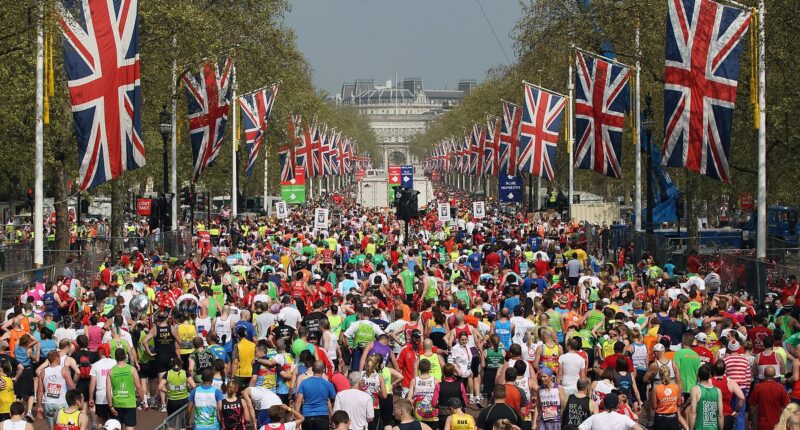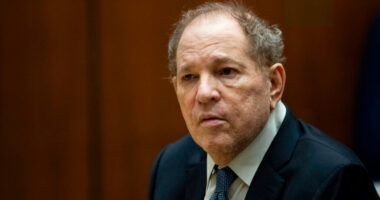Transgender women will still be allowed to run in the London Marathon as females – despite a Supreme Court ruling that they are not legally women – as race organisers revealed they had been boycotting X since the start of the year.
Race director Hugh Brasher, whose father Chris co-founded the marathon in 1981, confirmed that those taking part in the mass marathon event would be allowed to self identify as male, female or non-binary.
Transgender women are not however eligible to enter the elite, championship or good-for-age female races, as per rules set by World Athletics.
Brasher added during a press conference on Wednesday that London Marathon Events had been boycotting social media platform X since January, because it had become too ‘vitriolic’ and had ‘descended into the gutter’ since coming under the helm of Elon Musk.
The world’s richest man and ally of US President Donald Trump has been a vocal critic of trans women competing in female sport.
Clarifying the rules around eligibility, Brasher said: ‘To take part in championship, elite or in any age-group prizes, they have to be birth women, women as defined by the courts.
‘To take part in the mass event, it is a self-selection. Do I know the exact numbers of transgender women running? No, because it is a self-selection. How do you check?
‘People are asked to provide ID. But your ID can be your passport, your passport would say your gender and your gender can say female even if you were born male. This is complex.’

Transgender women running in the London Marathon mass race on Sunday can still enter as females – despite the UK Supreme Court ruling that they are not legally women (file pic)

Judges at the Supreme Court last week ruled that a woman should be defined by biological sex in the Equality Act – a verdict which is likely to have major implications in sport

London Marathon boss Hugh Brasher said their policy will not be updated until the Equality and Human Rights Commission (EHRC) and Sport England issue new guidance in the summer
In 2023, Glenique Frank, who was born male but identifies as a woman, caused controversy after competing in marathons in New York and Tokyo as a man – but just weeks later was permitted to enter the London Marathon mass event as a woman.
The personal trainer from Nottingham later apologised for competing in the female category and promised not to do so again until undergoing surgery.
In a landmark verdict last week, judges at the Supreme Court ruled that a woman should be defined by biological sex in the Equality Act, something which is likely to have major implications in sport.
However, Brasher said the London Marathon would not update its policy until the Equality and Human Rights Commission (EHRC) and Sport England have issued their own new guidance in the summer.
‘We will meet what the law says but there has to be that detail coming out,’ said Brasher.
‘It is really difficult to predict what we would do. I have gone through loads of different scenario planning since the court delivered its verdict, but we have to wait until the commission gives its report.
‘We delight in being both inclusive but also protecting in competition the rights of women, which is incredibly important.
‘The London Marathon has been very clear on protecting women’s rights, that’s women from birth, in terms of competition.’

In 2023, Glenique Frank, who was born male but identifies as a woman, caused controversy after competing in marathons in New York and Tokyo as a man – but just weeks later was permitted to enter the London Marathon mass event as a woman
When asked about the event’s social media presence, Brasher revealed that the London Marathon has stopped posting on X because it was ‘ceasing to be a positive place’.
The @LondonMarathon account, which has 191,000 followers, last posted a message on January 17.
‘I think that there are some social media channels that are particularly vitriolic and descending into a gutter,’ he said.
‘As a result of that, London Marathon Events has actually come off one of those channels – X.
‘It’s off the back of just looking at the vitriol, the level of it, on that channel. It was ceasing to be a rational conversation. It was ceasing to be a positive place to be.
‘The London Marathon is about positivity. It is a force for good and we didn’t feel that channel shared those values – and therefore we have come off that channel.’
As one example, Brasher highlighted British long-distance runner Eilish McColgan, who recently revealed the abuse she has suffered on social media, mainly Instagram.

Brasher expressed sympathy for Eilish McColgan (pictured at the 2022 European Championships) after she highlighted the abuse she has suffered on social media, adding that the London Marathon has stopped posting on X
She is set to take part in her first London Marathon on Sunday, having had to withdraw from the 2023 event because of injury.
The 34-year-old – a Commonwealth champion at 10,000m in 2022 – recently said she is ‘numb’ to negative comments on social media about her body shape after she had posted a video of herself training on a treadmill.
Her mother and coach Liz McColgan – who won the 1996 London Marathon – had hit out at the negative replies, labelling them ‘demeaning and abusive’.
Brasher described the online abuse received by McColgan as ‘abhorrent’, praising the athlete for her ‘exemplary’ response.
More than 56,000 people are expected to take part in the 2025 event on Sunday, which could break the current record for finishers and will again raise millions of pounds for charity.

















